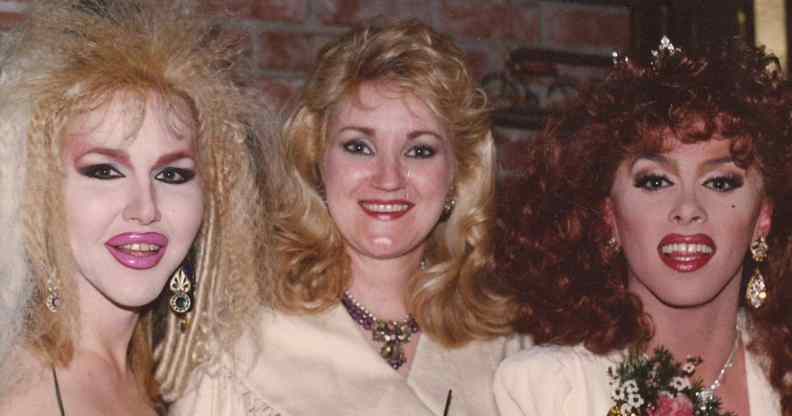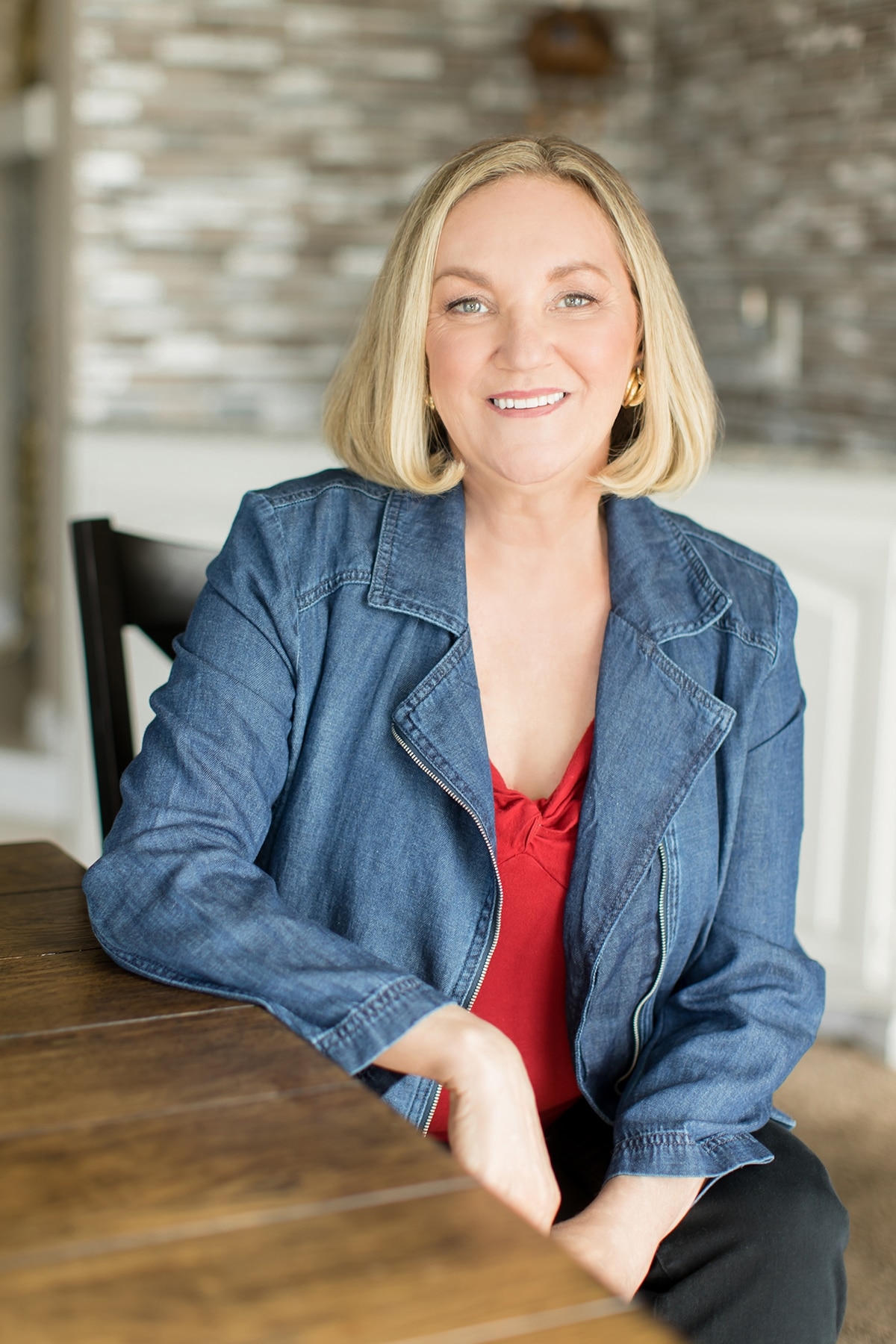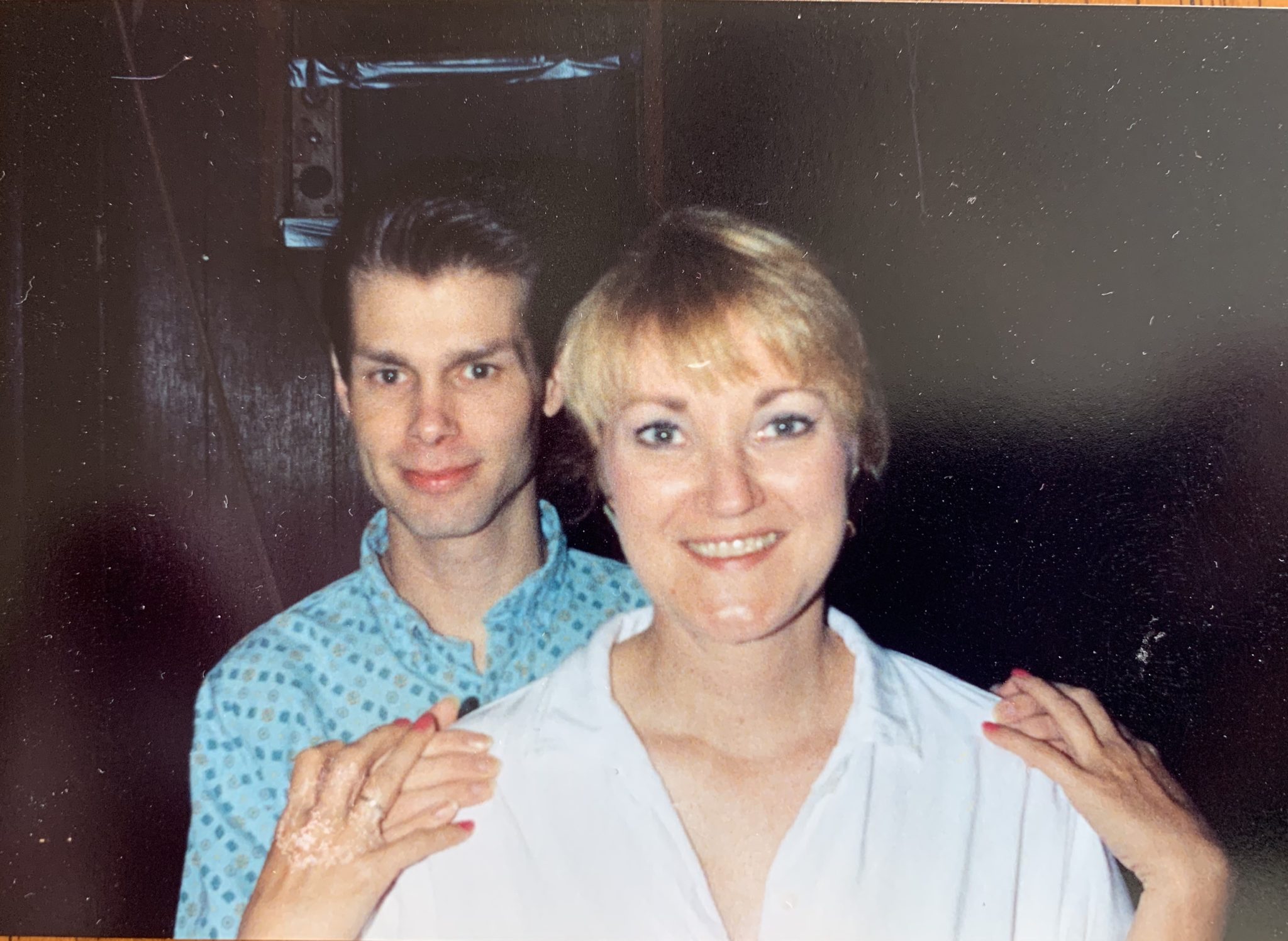‘AIDS angel’ who devoted her life to caring for gay men buried the ashes of countless abandoned sons

Ruth Coker Burks with two drag queens. (Provided)
You may not immediately know her name, but Ruth Coker Burks’ story is one of LGBT+ legend. And if you don’t know the story, well – y’all had better get yourselves acquainted with one of the must-have books of 2021. And yes, we’re going there even though it’s only March.
All the Young Men – co-written by Kevin Carr O’Leary – relives Coker Burks’ journey from realtor to real-life heroine.
“It’s a love letter to my guys,” she repeats, whenever praise is offered. The guys in question? Gay men who died of AIDS in the 80s and 90s – a situation that Burks fell into accidentally. While visiting a friend in hospital she saw nurses pull straws to enter the room of a man sick with an illness so new, it didn’t even have a proper name yet.
When she entered the room, stepping over the food left outside the door, she discovered a man so ill that he only wanted his mother. Jimmy’s mum hung up, twice, when Coker Burks called. Unable to leave him, Coker Burks sat with Jimmy for 13 hours until he died.
That day – which Coker Burks and O’Leary depict with a clarity that will make you cry four pages into reading the book – changed her life forever.
“I just did what everybody else should have done, but didn’t,” she says, of the resulting years she would spend looking after men with AIDS, diving into supermarket bins to get food to keep people alive, fighting with bigots and burying ashes of abandoned sons in a cemetery that had been left to her by her mother.
An ordinary woman with no experience, no training or resources in any medical field, word soon spread that Coker Burks would deal with those suffering from “gay cancer” when parents disowned them and the health and funeral industries were too scared and uneducated to do the right thing.
“There’re so many men who aren’t in the book,” she says of those that followed that fateful day. “But they were all as equally precious to me.”
All the Young Men has become a Times bestseller and these men now live forever in its pages. Travelling back in time presented a new set of challenges for its author, now 61.
I wanted my guys to live the lives they didn’t live long enough to have.
“I live with my guys every day, they’re always with me,” she says. “But when I really started getting to the nuts and bolts of it, yes, you do have PTSD, that flares its head.
“Kevin brought my guys back to life like they had never left. I was able to smell their cologne. When I would touch their faces to give them a hug goodbye or something – I could still feel their whiskers. It was just so wonderful to have them back living and just having their lives again.
“I wanted my guys to live the lives they didn’t live long enough to have.”
Referred to by many as an ‘Angel’, Ruth Coker Burks has never really been able to answer the question so many have asked of the lengths she went to – ‘why’?
“I didn’t do anything different. The only thing I did was what we were taught in church, to take care of the sick, take care of the poor, take care of the hungry, do all this and you’re doing it for me, or you could be doing it to me.”
It was a lesson her fellow church-goers could have learned a little better – when news of her AIDS work spread, they shunned her.
“I just felt like God had blinders on me where I couldn’t realise what was going on. I didn’t realise it was forever that people probably put their coffee cups down because they didn’t want to drink coffee that I had made. They probably had been doing that forever. I just never noticed.

Ruth Coker Burks dedicated much of her life to supporting gay men living with AIDS. (Provided)
“I didn’t have compassion shown to me as a child when I really needed it,” she explains. “I just gave my guys what any normal human being would do. I gave them my hand. I gave them everything I had to help them live. You don’t have time to go, ‘Wait a minute, did somebody just hurt my feelings?'” she chuckles softly. “You don’t even have time to notice.”
While the book details the difficulties of men ‘going home’, not all families shunned their sons. “I had two Raymond’s and neither one of their parents turned them away. One of those families, I got to interview for [national public radio] StoryCorps. We met at a hotel, I sat down ready, one of my first questions was, ‘After 30 years, what is it like knowing your son died of AIDS?’ And they go, ‘Oh, no, don’t you remember, honey, he died of a brain tumour.’ And everything stopped because all of my questions went out the window. I realised that that is how this 87-year-old couple was able to survive such a horrible ordeal for them also, because they love their son. They had to make it a brain tumour for them to be able to live.”
She recalls how hiding the real illness resulted in various other charities receiving donations, while those caring for people with AIDS received no funding.
“That’s why I was dumpster diving, and doing everything I could to feed them and take care of them. There was nothing for us to take care of them.”
Ruth Coker Burks says HIV should be ‘gone and done with’
Parallels to the COVID-19 pandemic hit hard.
“We’ve waited 40 years for a vaccine for AIDS. ‘It’s coming, it’s coming. It’ll be here this year.’ Forty years, and they get a vaccine for COVID in six months? It’s time for them to cough up the AIDS vaccine,” she says. When asked why she thinks it’s taken so long, she’s quick to reply.
“They make way too much money! $35,000 a year for everyone that’s on the cocktail. And then PrEP, there’s no telling what that cost. This is a virus, it’s a virus. Look, what would have happened, if they had put this much effort with COVID into HIV? It’d be gone and done with.”
I know gay men who actually married straight women, without the women knowing that they were gay, because they’re so afraid of Trump.
Money, it seems, has always been the problem at the heart of a health issue. “If you got federal funding for any kind of sex education or anything, you could only say ‘abstinence only’. Well, you and I both know – maybe one, both, or all of, us we’re here because ‘abstinence only’ doesn’t work for birth control. It’s certainly not going to work for HIV.
“To tell a gay man, ‘Don’t have sex’, really? So you don’t get any federal funds. Governor Rick Scott – he was the governor when this happened, now he’s the senator for Florida – he turned back $90 million in federal funded grant. If you ever get a grant, and you don’t use all that money, you send any of it back, you never get it again. And he sent it back to the federal government. That was for AIDS education, that was for medical help, that was for everything.”
Why would someone send back $90 million towards AIDS patients, you may ask…
“Because he’s an a**hole, is why he sent it back,” she states. “He’s just a Trump jerk and ‘anything that has to do with the quote unquote gay lifestyle is just dreadful and they deserve whatever they get’. It’s just so dangerous, what he did in, so many different ways.”
Homophobia, hate and fear run through the book as much as love and hope. She even had the Ku Klux Klan set fire to a cross on her front lawn. Twice.
“You can’t be anything in the south especially,” Coker Burks explains. “Especially during that time, you couldn’t have a business or anything and be openly gay. I recently talked to someone who’s in the book – who only gave postage stamps, but he remembers a Christmas tree and all this stuff that he gave. No, he didn’t. No he didn’t! He gave 11 postage stamps. Helen Keller could tell that he was gay. Obviously! I said, ‘Why didn’t anyone take me to lunch? Or invite me privately to lunch? Or just be nice to me?’ He said, ‘Oh, Ruth, we would have lost everything.’ And I said, ‘But I did. And I’m not even gay.’
“Everybody’s still in the closet over here. I know gay men who actually married straight women, without the women knowing that they were gay, because they’re so afraid of Trump.”
Fortunately Ruth Coker Burks found family elsewhere. Our House, a local gay bar that helped raise funds for her work, introduced her to some of her greatest friends, such as Billy, who’s story is at the heart of the book. Through Billy she discovered the world of drag…

Ruth Coker Burks with her friend Billy. (Provided)
“Over here there’s women now that are doing drag,” she beams. “I think it’s fabulous. If you can do anything that brings joy to your life and joy to somebody else’s life, do it, do it! We don’t have enough joy in life. Drag queens are the ones that started everything with AIDS. They were the backbone behind all of the protests in San Francisco. They’re the ones that got this whole thing started in helping their fellow human beings regardless of what is going on in your life.”
She says that she was “so shocked” by RuPaul’s glowing review of the book where he calls it “deeply moving” and a “must read”. Might she return the favour by appearing on Drag Race? “No one has asked,” she says, “It would be fun!”
Famously, Ruth Coker Burks wore a drag queen’s frock to president Clinton’s inauguration ball – who she’s known since growing up.
“I did!” she laughs. “I got it from Miss Misty McCall. Oh my gosh, when I went into her drag closet I just felt like in The Wizard of Oz, when she landed and the little Munchkins came out. I was just like, ‘Oh, my God, look at this closet.’ He had taken two bedrooms, taken the wall down and made it into one big fabulous drag closet. Oh my gosh, I felt like a million dollars.”
It may have been nearly three decades, but she still has Misty’s garment.
“I’ll never get rid of that dress,” she says. “It survived four hurricanes in six weeks. I saved that dress and Billy’s dress – I made sure I knew where those were at all times!”
The presidency of Clinton – who had later reached out to food banks to help her – ultimately signalled a long-overdue change. Coker Burks had previously said, “If it had not been for Bill Clinton becoming president, I don’t think we would have stopped the AIDS crisis.” Does she think that Clinton broke the back of change?
“Oh absolutely, absolutely,” she agrees. “He did the ‘Don’t Ask, Don’t Tell’ in the military and the LGBT+ community of today, they weren’t alive when he did that. It was cheered by the LGBT+ community because that was the most he could do at that time politically, because he had other things he wanted to do, like save people’s lives, and tried to do whatever he could to stop this virus.
“He’s the one that put the pedal to the metal for federal funding. He’s the one that called together the first White House conference on HIV and AIDS, and that was in 92 or 93. We’d been waiting a decade for any president to do anything and no one did until president Clinton did. He did overseas in Africa and other countries that needed help. I will go to my grave saying, and knowing for a fact, that there are many, many men who would not be alive today had it not been for president Bill Clinton.”
This change came with a cost to the work Coker Burks did, however. After a decade of caregiving, she was sidelined.
“When money started flowing, I’m telling you straight people – who wouldn’t cross the street if an AIDS person had fallen down – now there were 50 of them helping that poor person up,” she explains. “I was on the committee that got the Ryan White Comprehensive CARE act passed [in 1990]. That’s where we got our federal funding for our AIDS education and care. When that money became available, EVERYBODY loved AIDS patients, ‘Oh, I’ve been loving AIDS patients for 15 minutes now.’ It was just horrendous. They all had letters behind their names like MD or PhD and I didn’t, I wasn’t able to finish my education because I had men dying. When I had the time, I didn’t have the money and when I had the money, I didn’t have the time.
“After people started living with HIV instead of dying, my job was functionally obsolete at that time. Plus, no one wanted to hear that people were dying of AIDS, they just wanted to hear that people were living with it. But they were still dying from it. It was like, ‘Yay, we don’t have to worry about that anymore.'”
She recalls that she, and those who lived, “kind of went back to our own corners and licked our wounds”.
It’s a battle she’s never stopped fighting. As recently as 2013, Burks experienced prejudice and lost work when standing up for children who were publicly outed for being HIV-positive. “I just said, ‘It’s not 1985 we can’t be that ignorant,'” she recalls of a television interview that led to her being “blackballed and kept from working in any funeral home or cemetery”.
While she’s been able to revisit her guys through the pages of All the Young Men, she says that films and television shows about the time are difficult to relive.
“Oh my gosh, yes. I never watch Pose over here because it was just too much. But I do want to see It’s a Sin. That’s such a title, honey that’s so perfect. It’s such a sin how we treated AIDS patients. Fellow human beings with a disease. It was just a virus, just like today, the luck of the draw.”
All The Young Men by Ruth Coker Burks is published in hardback by Trapeze, £16.99. It’s available on Kindle, audio or hardback from Amazon while signed copies are available here.
This article contains affiliate links, PinkNews may earn revenue if you click through and purchase products through the links.

